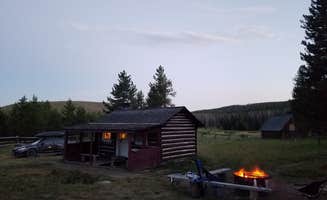Cabin rentals near Cobalt, Idaho provide rustic lodging options within the Salmon-Challis National Forest at elevations typically ranging from 5,000 to 7,200 feet. These forest service accommodations serve as base camps for wilderness exploration, fishing, and hiking in remote mountainous terrain. Many cabins remain inaccessible during winter months due to snow accumulation on forest roads.
What to do
Wildlife observation: The cabins surrounding Cobalt offer excellent wildlife viewing opportunities. At Hogan Cabin, located at 7,200 feet elevation, visitors frequently spot large mammals in adjacent meadows. A visitor reported, "Saw several deer and elk feeding in the field near the cabin, as well as a moose in the marsh along the creek."
Fishing: Non-motorized fishing is popular at several lakes near rustic cabins. The remote location provides a peaceful angling experience away from crowds. At Twin Lakes, one camper observed, "We watched others catch many trout out of kayaks with fly rods."
Hiking: Numerous trails lead from cabin locations into surrounding wilderness areas. Trails vary from moderate day hikes to challenging backcountry routes. A visitor at Twin Lakes noted, "Great hiking trail," while another guest at Hogan Cabin mentioned, "Up at 7200ft you get a little winded hiking around, but the incredible scenery is worth it."
What campers like
Solitude: The remote locations of these cabins provide genuine isolation from crowds and technology. A camper at Yellowjacket Guard Station wrote, "I was in this area for about 2 weeks and didn't see anyone I didn't plan to! A refreshing breath of solitude."
Lake access: Several cabins offer direct water access for swimming, fishing, and paddling. Twin Lakes provides waterfront accommodations in a mountain setting. According to one visitor, "Large, flat sites - many of which are right on the water. Gorgeous views with the lakes nestled between mountains!"
Historic structures: Many cabins maintain their historic character while providing basic shelter. The Yellowjacket area features abandoned mining sites that add historical interest. One camper commented, "Driving up to Yellowjacket and through the abandoned mine sites feels like a step into the past. The 'ghost town' looks more like several abandoned mines, but is still so interesting to see."
What you should know
Road conditions: Access roads to most cabins are unpaved and challenging. A visitor to Twin Lakes cautioned, "It's about a 15 mile commute on a gravel road to get there. If your plan is to stay at the campsite for the duration of your visit I would recommend it. But if you are going to explore the area you have to make the 30 mile round trip in order to get to the main road."
Limited supplies: Pack all essential items before arrival as stores are not nearby. Visitors to Twin Lakes Cabin noted, "Parking space was limited to one single vehicle without a trailer. Firewood and lantern were not provided."
Seasonal pests: Spring brings significant tick activity in the Cobalt area. At Yellowjacket Guard Station, a visitor warned, "In mid-May, this place was seemed like ground-zero for ticks. Watch out and check often! Other wildlife seen included rattlesnakes and deer."
Tips for camping with families
Temperature preparation: Mountain elevations cause significant temperature drops at night, even in summer. A family staying at Twin Lakes advised, "The mosquitos are terrible so bring lots of deet, and in July it gets to be around 30* F at night so bring lots of extra blankets."
Kid-friendly water areas: Several lakes provide shallow swimming areas appropriate for children. A camper at Twin Lakes described it as "Perfect for first time swimmers. Very quiet."
Space considerations: Andreas on the River RV Park offers cabin options with more amenities than forest service cabins, including proximity to town resources. A visitor shared, "We enjoyed 2 nights here alongside the river with full hookups. Easy 5 minute walk to town. Great local grocery, bakery, and a few breweries."
Tips from RVers
Parking limitations: Forest service cabins typically have very limited parking areas unsuitable for trailers or large vehicles. At Twin Lakes, a visitor cautioned, "The road is pretty long, and narrow. Not advisable for pulling a large trailer."
Alternative accommodations: When seeking more amenities than forest service cabins provide, private RV parks in the region offer cabin rentals with hookups. A guest at Andreas on the River RV Park shared, "Kind of shocked it was $45 a night after so much free camping! But nice to have hookups and our own deck looking over the river watching osprey fish."



